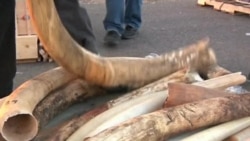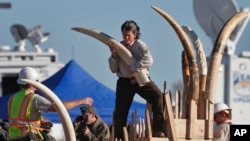Africa's elephants are being slaughtered at a record pace by poachers who hope to get rich by selling their ivory tusks.
On Thursday, U.S. officials sent a powerful anti-poaching message by destroying nearly 6,000 kilograms of confiscated ivory tusks, carvings and jewelry.
Conservationists say the key to ending the poaching of elephants is to make it unprofitable to do so.
"Anytime we can remove ivory from the marketplace it’s a win for elephants, because it suggests to the world that there isn't profitability to be had by selling ivory. And if there's no profitability in selling ivory, there's no profitability in poaching elephants,” explained Adam Robers, Executive Vice President of Born Free USA.
Before they were crushed, the confiscated ivory tusks, statues and ornaments were showed off by Fish and Wildlife officials, who said represented the killing of more than 2,000 adult elephants.
The items were seized from smugglers, traders and tourists after a global ban on the ivory trade took effect in 1989.
"Much of it is in what we might all trinkets, small carvings that are generally produced in Asia, brought back as souvenirs by tourists. That is a big part of the market here,” said Ginette Hemley, Senior Vice President of the World Wildlife Fund.
Meanwhile, U.S. Secretary of State John Kerry announced a $1 million reward on Wednesday for information leading to the dismantling of a Laos-based criminal syndicate, the Xaysavang Network, that Kerry said poaches elephants for ivory.
On Thursday, U.S. officials sent a powerful anti-poaching message by destroying nearly 6,000 kilograms of confiscated ivory tusks, carvings and jewelry.
Conservationists say the key to ending the poaching of elephants is to make it unprofitable to do so.
"Anytime we can remove ivory from the marketplace it’s a win for elephants, because it suggests to the world that there isn't profitability to be had by selling ivory. And if there's no profitability in selling ivory, there's no profitability in poaching elephants,” explained Adam Robers, Executive Vice President of Born Free USA.
Before they were crushed, the confiscated ivory tusks, statues and ornaments were showed off by Fish and Wildlife officials, who said represented the killing of more than 2,000 adult elephants.
The items were seized from smugglers, traders and tourists after a global ban on the ivory trade took effect in 1989.
"Much of it is in what we might all trinkets, small carvings that are generally produced in Asia, brought back as souvenirs by tourists. That is a big part of the market here,” said Ginette Hemley, Senior Vice President of the World Wildlife Fund.
Meanwhile, U.S. Secretary of State John Kerry announced a $1 million reward on Wednesday for information leading to the dismantling of a Laos-based criminal syndicate, the Xaysavang Network, that Kerry said poaches elephants for ivory.







